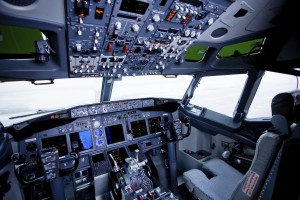
Aerospace Standard 9100 (AS9100) is the standard covering a QMS within the aerospace industry. For anyone who works with key clients such as airlines, NASA or the U.S. Department of Defense, AS9100 certification is a standard certification requirement.
Revision D (AS9100D) will impact countless aerospace manufacturers of all sizes, whether they are rewiring a cockpit panel or building a new airplane from scratch. While companies knew this requirement was coming, given the original release date was set for 2014 and the standard was finally released two years later, the delay doesn’t diminish the importance or the pressure that companies are facing to transition to the revised standard.
If you don’t want to lose your AS9100 certification, you must be in compliance by September 2018, which is right around the corner. If you’ve been procrastinating, you should know that the impact of these changes will go beyond technical compliance—and they are kind of a big deal.
For those that may be affected, we’ve compiled some of the most important points around AS9100D.
With AS9100D, you can expect:
- Extensive Changes: Unlike previous updates which may have affected only a few pieces, approximately 98% of the standard has changed with AS9100D. Further, there are so many changes that the audit process is more expensive and has been extended to 6 1/2 days.
- Prominent Terminology Variations: Both simple and complex terms are being replaced or adopted for universal use. For example, “Products” will now be known as “Products and Services,” and “Production Process Verification (PPV)” is replacing “FAI.”
- A Focus on Accountability: Counterfeit parts, supplier oversight, post-delivery support, supply change management, and other components have renewed focus and stringent requirements. One specific example is a stipulation for tighter compliance to the Plan-Do-Check-Act cycle.
- A Reduction of Individualism: This is one area where AS9100D goes beyond technical compliance and considers changes in culture. Several of the new requirements look to achieve a greater focus on a holistic view of production and collaboration rather than working in silos. As a post on the Postwaves forum suggested, the entire organization should learn how to think in additional terms, considering how it delivers value to its customers, not just how its functions operate.
Why is so much changing?
“AS9100 Revision D helps enhance a certified organization’s ability to meet customer requirements and satisfy expectations,” says Gene Morrison, Intertek Business Assurance’s global aviation, space, and defense program manager. “It accomplishes this not only through a focus on risk-based thinking, but also by providing a consistent foundation for business systems of all sizes and complexities.”
So, in theory, the changes were made by the framers of the standard to improve customer satisfaction, but the focus on accountability also ensures more rigorous safety protocols. With many of the new requisites, organizations need to vigilantly incorporate risk-based thinking at every step: determining the factors that could cause its processes and its quality management system to deviate from the planned results and put preventive controls in place to minimize the potential negative effects before they arise.
A New Concentration on Counterfeit Parts
Unlike previous standards, AS9100D specifically addresses the management of counterfeit parts. In many cases, manufacturers may be unaware counterfeit parts are being sourced, but the FAA estimates that of the 26 million parts installed on airplanes each year, 2 percent are likely counterfeit, and the use of substandard parts can create a huge risk to the safety of an aircraft.
To help prevent the use of counterfeit parts, AS9100D makes the following recommendations (among others):
- Appropriate training of employees to recognize and prevent the use of counterfeit parts
- Developing controls to ensure parts and components were sourced from the original or authorized manufacturers
- Verification and testing methodologies are implemented to detect counterfeit parts
The Big Nine for AS9100D
While there are several new and revised areas of AS9100 that will come with Rev D, as well as much more specific language and terms which you will need to adhere to, here are nine “big” changes that you should be aware of:
- Product Safety
Focusing on the product safety during the entire lifecycle, new product safety specifications have been added in carefully selected areas. - Human Factors
New considerations in the nonconformity and corrective action clause include human factors. The goal is to identify the root cause and ensure nonconformities do not recur. - Risk
Merging current AS9100 risk management requirements with new ISO 9001 requirements means risk-based thinking is not an integral part of the entire management process. - Preventive Action
The International Aerospace Quality Group ASP100-series reinforced clause requirements (which had previously been absorbed into risk and opportunities, and nonconformity and corrective action clauses) by including several additions. - Counterfeit Parts
As outlined above, new basic requirements which are appropriate to the product and process have been introduced in selected areas. - Project Management
To address user interpretation issues, project management has been combined with the operation planning clause of AS9100. - Configuration Management
To address stakeholder needs and to specify requirements in more simplified terms, the configuration management clause has been clarified and improved. - Post-delivery Support
The new ISO 9001 requirements have been merged with the current AS9100 series requirements. - Product Realization and Planning
Planning terms and processes have been clarified and enhanced throughout.
To meet the challenges of todays global demands, value chains, and the requirements put forth to continue to do business in the best way possible, your manufacturing company must continuously evolve its standards. OEMs will need to be more diligent about their suppliers and the quality of products, requiring more oversight and management of data. ACDi is currently AS9100D certified and is helping companies in the aerospace industry achieve their electronics manufacturing initiatives.
